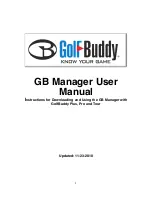
Mambo Hardware Description
Version 1.01
1.5 Electronic devices
Most electronic equipment, for example in hospitals and motor vehicles is shielded
from RF energy. However, RF energy may affect some malfunctioning or improperly
shielded electronic equipment.
1.6 Vehicle electronic equipment
Check your vehicle manufacturer’s representative to determine if any on board
electronic equipment is adequately shielded from RF energy.
1.7 Medical electronic equipment
Consult the manufacturer of any personal medical devices (such as pacemakers,
hearing aids, etc.) to determine if they are adequately shielded from external RF
energy.
Turn your MAMBO device OFF in health care facilities when any regulations posted in
the area instruct you to do so. Hospitals or health care facilities may be using RF
monitoring equipment.
1.8 Aircraft
Turn your MAMBO OFF before boarding any aircraft.
Use it on the ground only with crew permission.
Do not use it in the air.
To prevent possible interference with aircraft systems, Federal Aviation Administration
(FAA) regulations require you to have permission from a crew member to use your
modem while the plane is on the ground. To prevent interference with cellular
systems, local RF regulations prohibit using your modem whilst airborne.
1.9 Children
Do not allow children to play with your MAMBO device. It is not a toy. Children could
hurt themselves or others (by poking themselves or others in the eye with the
antenna, for example). Children could damage the modem or make calls that
increase your modem bills.
1.10 Blasting areas
To avoid interfering with blasting operations, turn your device OFF when in a
“blasting area” or in areas posted: „turn off two-way radio“. Construction crew often
uses remote control RF devices to set off explosives.
1.11 Potentially explosive atmospheres
Turn your MAMBO device
OFF
when in any area with a potentially explosive
atmosphere. It is rare, but your modems or their accessories could generate sparks.
Sparks in such areas could cause an explosion or fire resulting in bodily injury or even
death.
Areas with a potentially explosive atmosphere are often, but not always, clearly
marked. They include fuelling areas such as petrol stations; below decks on boats;
fuel or chemical transfer or storage facilities; and areas where the air contains
chemicals or particles, such as grain, dust or metal powders.
This confidential document is a property of FALCOM GmbH and may not be copied or circulated without previous permission.
Page 7






































